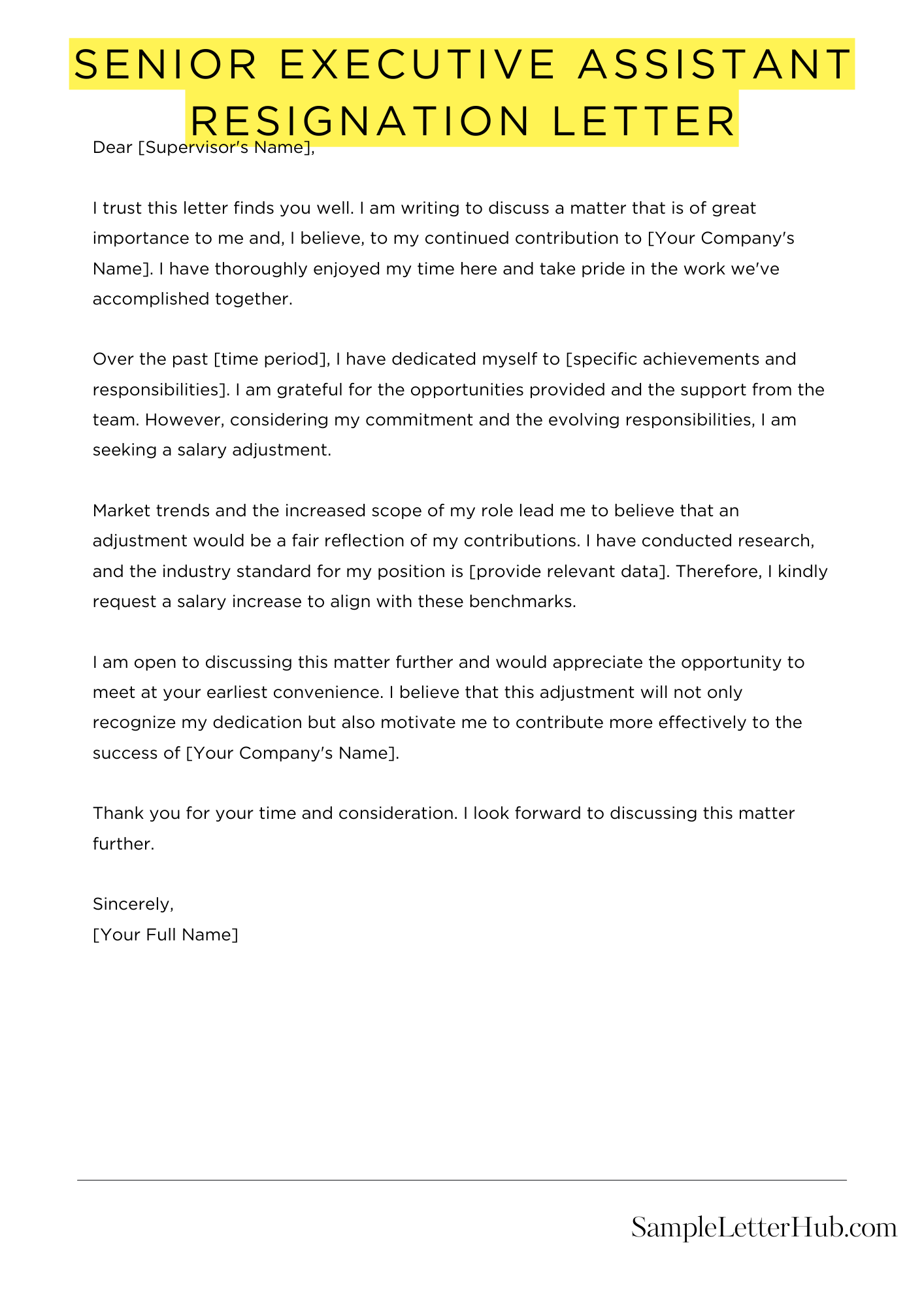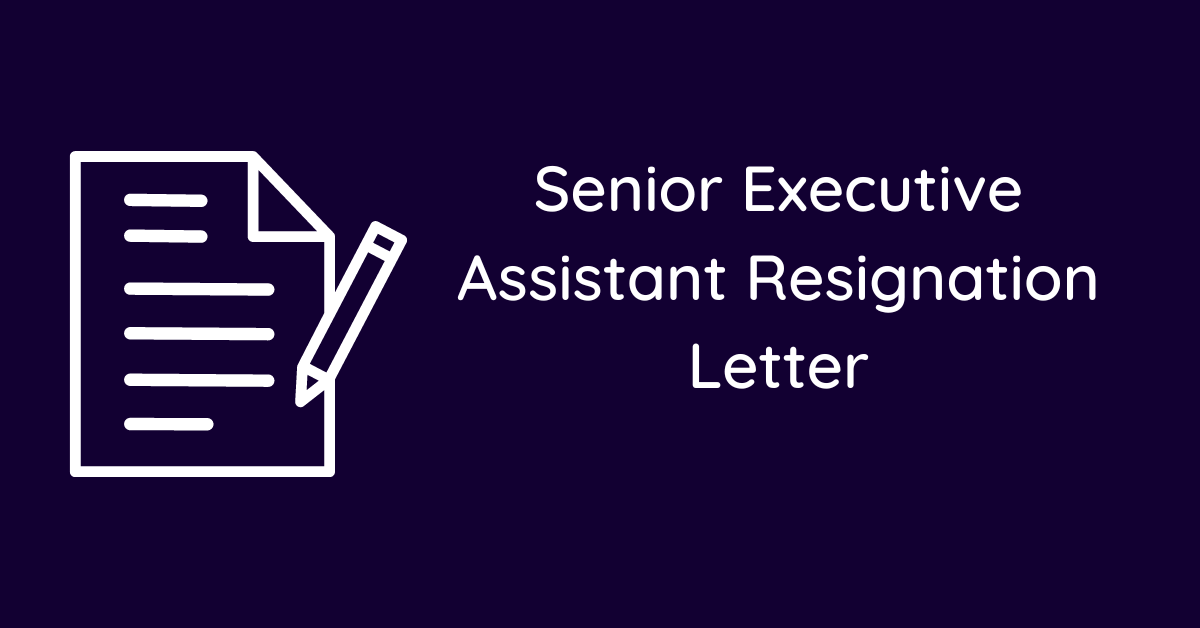If you’re a senior executive assistant who’s decided to move on to new challenges, you’ll need to write a resignation letter that’s both professional and polite. In this blog post, we’ll share an example of a senior executive assistant resignation letter that you can use as a template.
When writing your resignation letter, it’s important to be clear and concise about your decision to leave. You should also be polite and humble in your tone. Remember, you want to leave a good impression on your employer, even though you’re moving on.
Below, we’ve shared a template for a senior executive assistant resignation letter that you can use. Feel free to adapt it to your own needs.
Senior Executive Assistant Resignation Letter
Dear [Recipient Name],
Please accept this letter as formal notification that I will be resigning from my position as Senior Executive Assistant, effective two weeks from today, [Last Date of Employment].
During my tenure at [Company Name], I have had the privilege of working alongside a talented team and contributing to the company’s success. I am grateful for the opportunities and experiences I have gained during my time here.
I wish you and [Company Name] all the best in the future.
Sincerely,
[Your Signature]
Short Senior Executive Assistant Resignation Letter Sample
Please accept this letter as formal notification that I am resigning from my position as Senior Executive Assistant at [Company Name]. My last day of employment will be [Your Last Day]. Thank you for the opportunity to grow and learn during my time here. I wish you and the company continued success. I am happy to assist in the transition process to ensure a smooth handover of my responsibilities.
I wish you all the best with your senior executive assistant resignation letter.
When it’s time to say farewell, expressing your gratitude and best wishes can make the transition smoother:

How to Write a Senior Executive Assistant Resignation Letter
1. Start with a Formal Salutation
Begin your letter with a formal salutation, such as “Dear [Manager’s Name].”
2. Express Your Gratitude
Express your gratitude for the opportunity to work as a Senior Executive Assistant. Mention specific experiences or projects that you enjoyed and learned from.
3. State Your Resignation
Clearly state your intention to resign from your position. Include your last date of employment.
4. Offer to Help with the Transition
Offer to assist with the transition during your notice period. This shows that you are committed to leaving the company on good terms.
5. End with a Professional Closing
End your letter with a professional closing, such as “Sincerely,” followed by your signature and typed name.
6 Most Frequently Asked Questions About Senior Executive Assistant Resignation Letters
When it comes to resigning from your position as a Senior Executive Assistant, it’s important to do so professionally and respectfully. A well-written resignation letter can help you leave a positive impression and maintain good relationships with your former employer. Here are the six most frequently asked questions about senior executive assistant resignation letters, along with their answers:
1. What should I include in my resignation letter?
Your resignation letter should include the following information:
* Your name and contact information
* The date
* The name of the person you are resigning to
* A statement of your resignation
* Your last date of employment
* A brief expression of gratitude
* Your signature
2. How should I format my resignation letter?
Your resignation letter should be formatted in a professional and easy-to-read manner. Use a standard font, such as Times New Roman or Arial, and 12-point font size. Left-align your text and use single spacing.
3. What should I say in my resignation letter?
In your resignation letter, you should be clear and concise. State your intention to resign and your last date of employment. You can also express your gratitude for the opportunity to work for the company and wish them well in the future.
4. How should I submit my resignation letter?
You should submit your resignation letter in person to your supervisor or manager. If you are unable to do so, you can send it via email or mail.
5. What should I do after I submit my resignation letter?
After you submit your resignation letter, you should continue to perform your job duties to the best of your ability until your last day of employment. You should also help train your replacement, if possible.
6. What if I have any questions about my resignation letter?
If you have any questions about your resignation letter, you should speak to your supervisor or manager. They can help you ensure that your letter is professional and appropriate.
Before making the decision to resign from your job, it’s essential to consider the legal aspects:
Understanding your emotions after quitting your job is important. Explore why you might be feeling sad:
Related
- Resignation letter sample
- Forced resignation letter
- Resignation letter due to going abroad
- Resignation letter due to marriage
- Resignation letter due to other opportunity
- Resignation letter due to mistake

